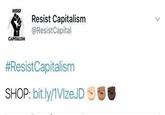Late Capitalism
Part of a series on Politics / Government. [View Related Entries]
[View Related Sub-entries]
Overview
Late Capitalism or late-stage capitalism is term used by Marxists and left-leaning political activists to describe post-World War II capitalism. Online and in modern context, people use late capitalism to describe the gross wealth and income inequality between the rich and poor in the globalized world, particularly in how corporations and Silicon Valley manipulate the post-2008 economy to appear normal, livable or prosperous for the low and middle class.
History
German economist Werner Sombart coined the term "late capitalism" in 1902 in his book Der moderne Kapitalismus ("Modern Capitalism").[1] In the book, Sombart uses "late capitalism" to distinguish between early capitalism and the capitalism of the early 1900s. However, Marxists in the post-World War II economy of 1945 use the term to discuss the end of capitalism, especially during the rise of multinational corporations. In his 1972 PhD dissertation, Marxist economist Ernest Mandel used the term to describe the failings of capitalism and a time that will enable socialists to seize the means of production.[2]
In 1984 Fredric Jameson wrote an essay entitled Postmodernism, or the Cultural Logic of Late Capitalism, which he turned into a book in 1991. Jameson's use of late capitalism is among the most cited today, appropriating the word to create a connection between modernity and economy. The Atlantic[2] says, "Jameson argued that the globalized, post-industrial economy had given rise to postmodernist culture and art. Everything, everywhere, became commodified and consumable. High and low culture collapsed, with art becoming more self-referential and superficial. He told me he saw late capitalism as kicking into gear in the Thatcher and Reagan years, and persisting until today."
In 2008, mentions of "late capitalism begin on Twitter (examples below). However, unlike post-Occupy use of the word, it is not used with the same sarcasm that would later become associated with the meme.


On April 12th, 2011, A Young Man's Guide to Late Capitalism by Peter Mountford is published.[3] The book helps spread use of the term. The book description reads:
On his first assignment for a rapacious hedge fund, Gabriel embarks to Bolivia at the end of 2005 to ferret out insider information about the plans of the controversial president-elect. If Gabriel succeeds, he will get a bonus that would make him secure for life. Standing in his way are his headstrong mother, herself a survivor of Pinochet’s Chile, and Gabriel’s new love interest, the president’s passionate press liaison. Caught in a growing web of lies and questioning his own role in profiting from an impoverished people, Gabriel sets in motion a terrifying plan that could cost him the love of all those he holds dear.
In the tradition of Martin Amis, Joshua Ferris, and Sam Lipsyte--set against the stunning mountainous backdrop of La Paz and interspersed with Bolivia’s sad history of stubborn survival--Peter Mountford examines the critical choices a young man makes as his world closes in on him.

In 2011, during the Occupy Wall Street protests, late capitalism is used as a term describe the ills of capitalism following the economic recession. People on Twitter begin using the term to describe that which they are protesting.


During the 2016 U.S. Presidential Election saw a resurged interest in late capitalism thanks, in part, to the popularity of democratic candidate Bernie Sanders, an independent senator, who ran as a democratic socialist. Around this time, "late capitalism" becomes a derogatory term for the problems created by capitalism in the wake of the 2008 economic crisis. It becomes a meme online that describes the ways the post-economic crisis world is sold through lifestyle brands and the "gig economy."



On July 12th, 2016, Vox published an article entitled "Pokémon Go is everything that is wrong with late capitalism,"[5] which analyzed the popular video game Pokémon Go's connection to late capitalism.
On August 28th, the /r/LateStageCapitalism[6] subreddit launched. Within less than a year, the community has more than 170,000 subscribers.
Three months later, on November 28th, the Facebook group Humans of Late Capitalism[7] launched. Within less than a year, the group has more than 444,000 likes and 455,000 followers. Several months later, on January 9th, 2017, the Humans of Late Capitalism[8] Twitter account launched, which has more than 3,500 followers as of August.
On August 3rd, 2017, The Atlantic[4] published a video explainer about late capitalism entitled "What Does "Late Capitalism" Really Mean?" The video (shown below) examines the history of the term and what it means in the political climate of the 2017. It received more than 12,000 views in less than two weeks.
Related People
Bernie Sanders
Bernard “Bernie” Sanders (born September 8th, 1941) is an American politician who served as a member of the United States House of Representative from 1991 to 2007 and currently serves as the junior United States Senator since being elected to the office in 2007. After over two decades of public service as an independent legislator for the state of Vermont, Sanders rose to national prominence with the launch of his campaign for the Democratic Party’s nomination in the 2016 presidential election on May 26th, 2015. During his campaign, Sanders firmly established himself as a dark horse for the Democratic Party with primary and caucus victories in 22 states. In July 2016, Sanders officially endorsed his rival Hillary Clinton as the Democratic presidential candidate after she secured the number of delegates required for the party’s nomination.
Related Memes
United Airlines Passenger Removal
United Airlines Passenger Removal refers to the controversial ejection of a passenger from a United Airlines flight, after the airline informed the plane that they would be randomly selecting ticket-holders to give up their seats.
Kendall Jenner's Pepsi Ad
Kendall Jenner’s Pepsi Ad refers to a commercial for Pepsi starring Kardashian family member Kendall Jenner in which Jenner joins a protest and offers a police officer a can of Pepsi. As soon it was posted online, the commercial was widely criticized and mocked online for its tone-deaf attempt to evoke the tense relationship between protest movements in America such as Black Lives Matter and police, which the commercial purports to ease via Pepsi.
Porky
Porky is a cartoon character from a 1920 Soviet agitprop poster. In the poster and online, the character has been used to represent the bourgeois or ruling class, a literal capitalist pig. He is used in similar way as the Happy Merchant meme without the anti-semitic overtones.

Search Interest
External References
[1] Google Books – Der moderne Kapitalismus
[2] The Atlantic – Why the Phrase 'Late Capitalism' Is Suddenly Everywhere
[3] Amazon – A Young Man's Guide to Late Capitalism
[4] YouTube – What Does "Late Capitalism" Really Mean?
[5] Vox – Pokémon Go is everything that is wrong with late capitalism
[6] Reddit – /r/LateStageCapitalism
[7] Facebook – Humans of Late Capitalism
[8] Twitter – @HumansOfLate














Display Comments